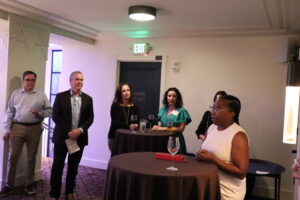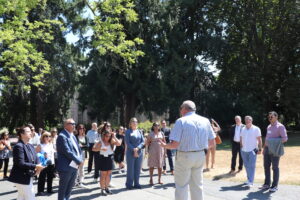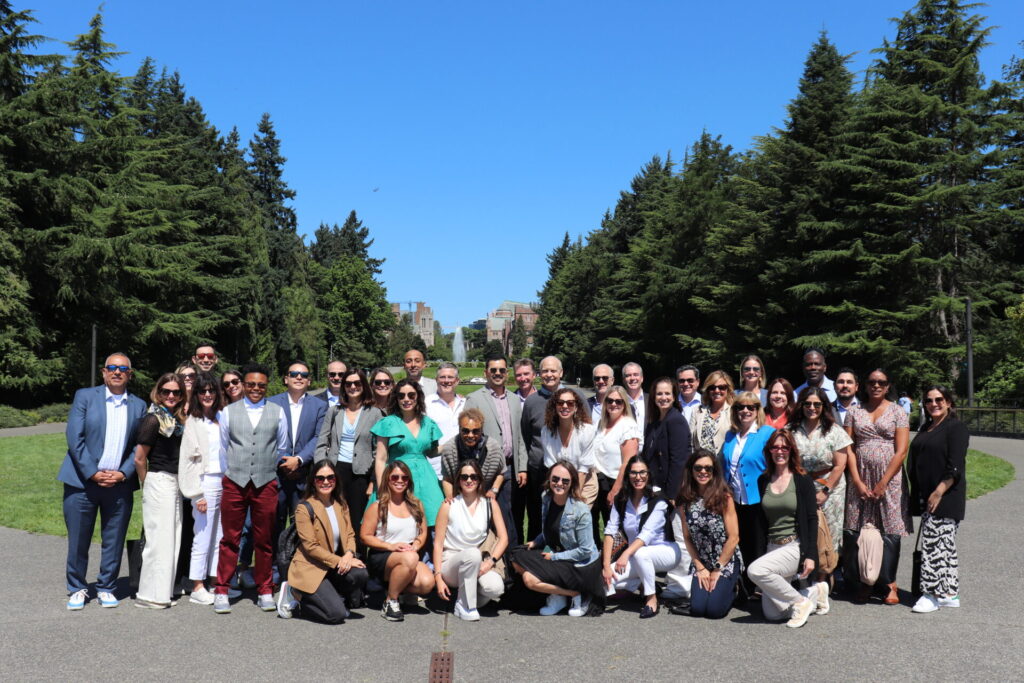Authored by Lisette Islas, Executive VP and Chief Impact Officer at MAAC, and EDC Vice Chair of Inclusive Growth
“Clear eyes, full hearts, can’t lose.”
Most every year, EDC hosts a Leadership Trip to a strategic metro. Guided by our Inclusive Growth strategy, the trips help expose dozens of San Diego’s private sector, nonprofit, academic, and government leaders to other regions engaged in similar work. After all, it sometimes takes stepping outside of our region to get the best look at who we are and who we want to be. This year: Seattle, Washington.
With more than 30 of San Diego’s most committed leaders in tow, we arrived in Seattle this July ready to learn about what makes the Pacific Northwest region so successful and what challenges have stymied it most. EDC’s President and CEO Mark Cafferty kicked off the three-day trip with the above Friday Night Lights quote to help frame the goals of the trip, plus the mindset needed to act once back home.
Clear eyes
Seattle is a true peer metro to San Diego, home to a globally competitive innovation cluster with audacious goals for its growth. While Seattle’s cost of living is lower than San Diego’s, it is the fastest-growing city in the country and rising home prices have led to gentrification and displacement. The state of Washington needs another Seattle’s-worth of housing units to address its housing supply shortage. The clarity of their direction and of their challenges comes from an impeccable degree of detail and data, both on their goals and on where they are falling short in meeting them. For example:
- Jobs: Eighty of Seattle’s CEOs made commitments to increase supplier diversity, yet only 0.1 percent of procurement can be tracked back to Black-owned businesses. (There was no mention of metrics on Latino-owned businesses.) These companies don’t always have consistent vendor data tracking—and you can’t improve what you can’t measure.
- Talent: Nationwide, more than 375,000 tech jobs remain unfilled. Given that each year as a country we graduate 75,000 computer science degrees and distribute 65,000 H1B visas in tech, that still leaves 235,000 jobs that must be filled in other ways. As home to some of the largest tech companies in the world including Amazon and Microsoft, Seattle has recognized the imperative for sourcing talent in new ways. Notably, through tech apprenticeship model Apprenti, companies can recruit people from non-tech backgrounds using an anonymized, skills-based application process to remove all the bias you don’t want and focus on all the talent you do. Eighty-six percent of these apprenticeships convert into full-time jobs after one year.
- Households: Through Challenge Seattle and their partners at Boston Consulting Group, the region has identified the root of a housing shortage challenge that looks very familiar to San Diego’s. Challenge Seattle identified the housing size, price, and place needed to make a dent in the lack of supply facing the region. Additionally, the group put out 15 long-term and four short-term recommendations for policy change ranging from zoning reform to below-market financing, and more.
Full hearts
 One inspiring moment was when our group heard from Alesha Washington, CEO of the Seattle Foundation, on the region’s continued struggles, which she says are often masked by its rapid growth and prominent tech companies. The region is majority white, and the economic hardships are most felt by people of color. Simply calling past policies what they were—racist—provides a sense of freedom to manage them directly and without ambiguity.
One inspiring moment was when our group heard from Alesha Washington, CEO of the Seattle Foundation, on the region’s continued struggles, which she says are often masked by its rapid growth and prominent tech companies. The region is majority white, and the economic hardships are most felt by people of color. Simply calling past policies what they were—racist—provides a sense of freedom to manage them directly and without ambiguity.
Another point of encouragement came in the context that while the Seattle metro accounts for more than half of the state’s population, it cannot succeed alone. Many of the challenges it faces are felt across the rest of Washington, so statewide cooperation is needed to solve them. Framing Seattle’s housing crisis as urgent to the state’s overall economic prosperity is one way Challenge Seattle has done just that.
Can’t lose
Perhaps the most galvanizing moment was during our closing session as the group took stock of all they had heard, shared what stood out the most, and reflected on our region’s own inclusive growth journey. What resonated most was the sense that, like our peer, San Diego has come a long way. When the economic case for inclusion was first developed in 2017, the road seemed long and the goals unreachable. However, despite the setbacks brought on by the pandemic, progress is being made – with EDC’s latest progress report launching next month. With an inclusive economic development agenda acting as a compass, many local organizations have shifted their focus or direction—and even small changes can have big impacts. As Halé Richardson of HomeFed Corporation put it, “Fueled by this ongoing dialogue, we’re now prioritizing childcare centers over swimming pools.”
 For decades, the inclusion challenge was left only to the social services and philanthropic community to solve. Now, the business case has been made and it is clear inclusive growth is imperative to the region’s competitiveness. Without it, industry too will cease to thrive.
For decades, the inclusion challenge was left only to the social services and philanthropic community to solve. Now, the business case has been made and it is clear inclusive growth is imperative to the region’s competitiveness. Without it, industry too will cease to thrive.
Economic development is an exercise in authenticity.
In San Diego, we know our data story well too. The challenges facing our region require all of us to adapt in order to create more quality jobs, skilled talent, and thriving households. If we are to remain competitive and attractive to both businesses and talent, we must embrace the challenges head-on, with each sector—public, private, non-profit—doing its part to promote a more inclusive San Diego. In the months ahead, EDC will convene select groups to make that clear and build on this momentum.
I remain committed to exploring different avenues for how we broaden and deepen our work across our three goals—through my role at EDC, my work at MAAC, and my engagement with our region at large—as a member of the community that cares deeply about San Diego’s future.
We may not reach all our stated goals by 2030, but the mere fact that we are striving toward them guarantees that we will be better off than than we are today.

Learn more about EDC’s Inclusive Growth work